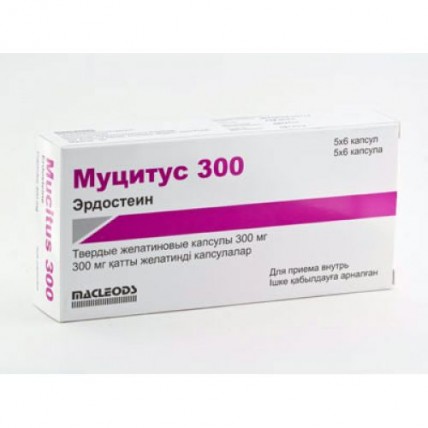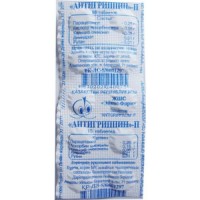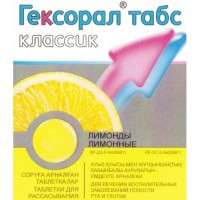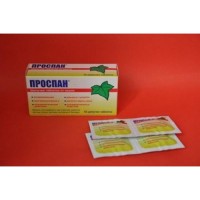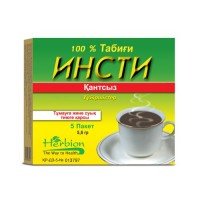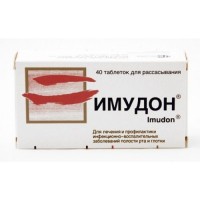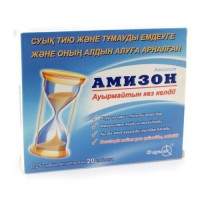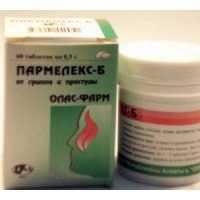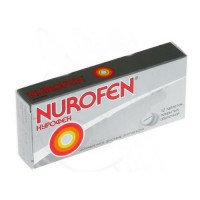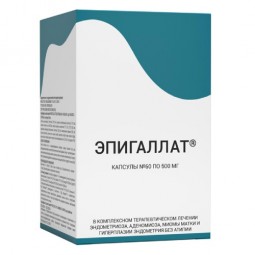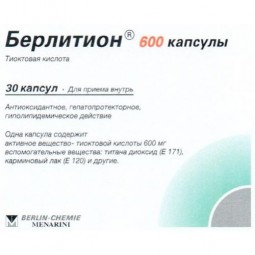Mutsitus 300 mg (30 capsules) hard gelatine
- $15.00
The instruction for medical use
of MUTSITUS 150 medicine
MUTSITUS 300
the Trade name
of MUTSITUS 150
of MUTSITUS 300
the International unlicensed
name Erdostein Lekarstvennaya a form
Solid gelatin capsules of 150 mg or 300 mg
Structure
One Mutsitus capsule 150 contains
active agent - erdostein 150 mg
excipients: microcrystalline cellulose of 66.0 mg, povidone of 2.5 mg, sodium of starch glikolit 5.0 mg, magnesium stearate of 1.5 mg,
structure of a cover of the capsule: the water purified sodium lauryl sulfate, methylparahydroxybenzoate, propilparagidroksibenzoat, E 132 indigo carmine, karmoizin E122, quinolinic yellow (E 104), bronopol, the PVP K-30, SLS, the titan dioxide, gelatin,
structure of the body of the capsule: the water purified sodium lauryl sulfate, methylparahydroxybenzoate, propilparagidroksibenzoat, indigo carmine (E 132), ponso 4R (E 124), quinolinic yellow (E 104), bronopol, the PVP K-30, SLS, the titan dioxide, gelatin.
One Mutsitus capsule 300 contains
active agent - erdostein 300 mg,
excipients: microcrystalline cellulose of 100.00 mg, povidone of 5.0 mg, sodium of starch glikolit 10.00 mg, magnesium stearate of 3.00 mg,
a capsule cover: the water purified sodium lauryl sulfate, methylparahydroxybenzoate, propilparagidroksibenzoat, dye diamond green, the titan dioxide, gelatin.
The description
Mutsitus 150
Firm gelatin capsules of No. in size 2 with the blue body and a brown lid.
Mutsitus 300
Firm gelatin capsules size No. of 0 C white body and blue lid.
Contents of capsules – powder of white or whitish color.
Pharmacotherapeutic group
Expectorant drugs. Mucolytics.
The code of automatic telephone exchange R05CB15
the Pharmacological
Pharmacokinetics Later properties of intake of an erdostein in a dose of 300 mg the maximum concentration of the main connection in plasma is on average observed in 1.6 hours and makes 0.9-1.6 mkg/ml. The area under a curve is 2.1 - 5.1 mkg*chas/ml. Erdostein is exposed to primary metabolism in a liver where there is a release of sulfhydryl groups to formation of 3 metabolites: N-tiodigli-kolilgomotsisteina, N-atsetilgomotsisteina, N-gomotsisteina. 64.5% of an erdostein contact proteins of blood plasma. Elimination half-life of an erdostein from plasma 1.22 (0.8-1.8) of hour, N-tiodiglikolilgomotsisteina – 0.92-2.33 hours, N-atsetilgomotsisteina – 0.58 - 4.99 hours. The pharmacokinetics of an erdostein does not change with age and at depression of function of kidneys (KK of 25-40 ml/min.). Elderly patients with a liver failure have a peak of concentration in plasma and the period of semi-life of an erdostein can raise therefore they need correction of a dose. Erdostein is brought mainly with urine, partially in not changed look, partially – in the form of metabolites. The general clearance for an erdostein after intake of 300 mg was 1538-4151 ml/min., for N-tiodigli-kolilgomotsisteina – 544-1142 ml/min., and for N-atsetilgomotsisteina – 90-199 ml/min. In a renal failure the accumulation of metabolites is possible.
The pharmacodynamics
Erdostein is mucolytic means. He contains 2 blocked tiolny groups which are released in the course of primary metabolism that allows it to destroy disulfide bridges of mucins and by that to improve mukotsiliarny clearance of air-conducting ways. All active metabolites of an erdostein show mucolytic and antioxidant activity which leads to increase in formation of a secret in bronchial tubes, reduces viscosity of a phlegm, improves passability of bronchial tubes due to increase in the mukotsiliarny index and antioxidant activity of a secret owing to binding of free radicals. Is suppressed α1-антитрипсиновое the oxidation caused by smoking (the main function α1-антитрипсина – to suppress activity of elastase, vyzvayemy neutrophils of lungs, which responsible for damage of a pulmonary parenchyma), the chemotaxis of polimofrnoyaderny neutrophils at smokers is restored.
Indications
- chronic obstructive diseases of lungs, a bronchoectatic disease, bronchial asthma, a mucoviscidosis
- acute and chronic bronchitis with phlegm hypersecretion
- chronic bronchitis of smokers
- exacerbation of chronic bronchial pneumonia.
To Accept a route of administration and doses inside, washing down with enough water, to or at meal time. The recommended dose: 300 mg 2-3 times a day. Duration of treatment is defined by a condition of the patient, on average of 7 - 10 days at acute processes, from 7 to 28 days in chronic diseases.
At elderly patients with chronic diseases of a liver the dose adjustment is necessary.
Side effects
- pains in epigastriums, nausea, vomiting, diarrhea, dryness in a mouth, heartburn, a headache
- an erythema, an itching and other symptoms of the increased hypersensitivity.
Contraindications
- hypersensitivity to the erdostein or products containing free sulphidic groups and also any other component of drug
- a homocystinuria
- pregnancy, the lactation period
- children's age up to 6 years.
Medicinal interactions
At simultaneous use of an erdostein and antibechics because of suppression of a tussive reflex there can be a secret accumulation in bronchial tubes (to apply a combination with care).
At a combination with amoxicillin its concentration in a phlegm increases that enhances efficiency of an antibiotic at treatment of infectious processes in bronchial tubes.
erdostein it is necessary to appoint special instructions In bronchial asthma and obstructive bronchitis with care under systematic control of bronchial passability.
With care apply at patients with renal failures, with a gullet varicosity in cirrhosis, at the increased risk of developing pulmonary bleeding and a pneumorrhagia, in bronchial asthma, a peptic ulcer of a stomach and a 12-perstny gut in a phase of aggravation and coronary insufficiency. Erdostein accept in 2 hours prior to reception of antibiotics to avoid decrease in absorption. With care to appoint along with proteolytic enzymes.
Use in pediatrics
the Efficiency and safety at children is not established.
There Is no feature of influence of medicine on ability to run the vehicle or potentially dangerous mechanisms data.
Overdose
Symptoms: diarrhea, vomiting, stomach aches, heartburn, nausea. Treatment: symptomatic.
A form of release and packing
On 6 capsules in blisters from aluminum foil.
On 5 or 2 blisters together with the instruction for use in the state and Russian languages place in a cardboard pack.
To Store storage conditions at a temperature below 25ºС in the dry place, to protect from light.
To store in the places inaccessible for children!
A period of storage
24 months
not to apply after an expiration date
Prescription status
According to the prescription
of Proizvoditel Makleods Pharmasyyutikalz Limited
304 Atlanta of Arcades, Andheri, Marol Cherch Road, Mumbai – 59, India
of MUTSITUS 150 medicine
MUTSITUS 300
the Trade name
of MUTSITUS 150
of MUTSITUS 300
the International unlicensed
name Erdostein Lekarstvennaya a form
Solid gelatin capsules of 150 mg or 300 mg
Structure
One Mutsitus capsule 150 contains
active agent - erdostein 150 mg
excipients: microcrystalline cellulose of 66.0 mg, povidone of 2.5 mg, sodium of starch glikolit 5.0 mg, magnesium stearate of 1.5 mg,
structure of a cover of the capsule: the water purified sodium lauryl sulfate, methylparahydroxybenzoate, propilparagidroksibenzoat, E 132 indigo carmine, karmoizin E122, quinolinic yellow (E 104), bronopol, the PVP K-30, SLS, the titan dioxide, gelatin,
structure of the body of the capsule: the water purified sodium lauryl sulfate, methylparahydroxybenzoate, propilparagidroksibenzoat, indigo carmine (E 132), ponso 4R (E 124), quinolinic yellow (E 104), bronopol, the PVP K-30, SLS, the titan dioxide, gelatin.
One Mutsitus capsule 300 contains
active agent - erdostein 300 mg,
excipients: microcrystalline cellulose of 100.00 mg, povidone of 5.0 mg, sodium of starch glikolit 10.00 mg, magnesium stearate of 3.00 mg,
a capsule cover: the water purified sodium lauryl sulfate, methylparahydroxybenzoate, propilparagidroksibenzoat, dye diamond green, the titan dioxide, gelatin.
The description
Mutsitus 150
Firm gelatin capsules of No. in size 2 with the blue body and a brown lid.
Mutsitus 300
Firm gelatin capsules size No. of 0 C white body and blue lid.
Contents of capsules – powder of white or whitish color.
Pharmacotherapeutic group
Expectorant drugs. Mucolytics.
The code of automatic telephone exchange R05CB15
the Pharmacological
Pharmacokinetics Later properties of intake of an erdostein in a dose of 300 mg the maximum concentration of the main connection in plasma is on average observed in 1.6 hours and makes 0.9-1.6 mkg/ml. The area under a curve is 2.1 - 5.1 mkg*chas/ml. Erdostein is exposed to primary metabolism in a liver where there is a release of sulfhydryl groups to formation of 3 metabolites: N-tiodigli-kolilgomotsisteina, N-atsetilgomotsisteina, N-gomotsisteina. 64.5% of an erdostein contact proteins of blood plasma. Elimination half-life of an erdostein from plasma 1.22 (0.8-1.8) of hour, N-tiodiglikolilgomotsisteina – 0.92-2.33 hours, N-atsetilgomotsisteina – 0.58 - 4.99 hours. The pharmacokinetics of an erdostein does not change with age and at depression of function of kidneys (KK of 25-40 ml/min.). Elderly patients with a liver failure have a peak of concentration in plasma and the period of semi-life of an erdostein can raise therefore they need correction of a dose. Erdostein is brought mainly with urine, partially in not changed look, partially – in the form of metabolites. The general clearance for an erdostein after intake of 300 mg was 1538-4151 ml/min., for N-tiodigli-kolilgomotsisteina – 544-1142 ml/min., and for N-atsetilgomotsisteina – 90-199 ml/min. In a renal failure the accumulation of metabolites is possible.
The pharmacodynamics
Erdostein is mucolytic means. He contains 2 blocked tiolny groups which are released in the course of primary metabolism that allows it to destroy disulfide bridges of mucins and by that to improve mukotsiliarny clearance of air-conducting ways. All active metabolites of an erdostein show mucolytic and antioxidant activity which leads to increase in formation of a secret in bronchial tubes, reduces viscosity of a phlegm, improves passability of bronchial tubes due to increase in the mukotsiliarny index and antioxidant activity of a secret owing to binding of free radicals. Is suppressed α1-антитрипсиновое the oxidation caused by smoking (the main function α1-антитрипсина – to suppress activity of elastase, vyzvayemy neutrophils of lungs, which responsible for damage of a pulmonary parenchyma), the chemotaxis of polimofrnoyaderny neutrophils at smokers is restored.
Indications
- chronic obstructive diseases of lungs, a bronchoectatic disease, bronchial asthma, a mucoviscidosis
- acute and chronic bronchitis with phlegm hypersecretion
- chronic bronchitis of smokers
- exacerbation of chronic bronchial pneumonia.
To Accept a route of administration and doses inside, washing down with enough water, to or at meal time. The recommended dose: 300 mg 2-3 times a day. Duration of treatment is defined by a condition of the patient, on average of 7 - 10 days at acute processes, from 7 to 28 days in chronic diseases.
At elderly patients with chronic diseases of a liver the dose adjustment is necessary.
Side effects
- pains in epigastriums, nausea, vomiting, diarrhea, dryness in a mouth, heartburn, a headache
- an erythema, an itching and other symptoms of the increased hypersensitivity.
Contraindications
- hypersensitivity to the erdostein or products containing free sulphidic groups and also any other component of drug
- a homocystinuria
- pregnancy, the lactation period
- children's age up to 6 years.
Medicinal interactions
At simultaneous use of an erdostein and antibechics because of suppression of a tussive reflex there can be a secret accumulation in bronchial tubes (to apply a combination with care).
At a combination with amoxicillin its concentration in a phlegm increases that enhances efficiency of an antibiotic at treatment of infectious processes in bronchial tubes.
erdostein it is necessary to appoint special instructions In bronchial asthma and obstructive bronchitis with care under systematic control of bronchial passability.
With care apply at patients with renal failures, with a gullet varicosity in cirrhosis, at the increased risk of developing pulmonary bleeding and a pneumorrhagia, in bronchial asthma, a peptic ulcer of a stomach and a 12-perstny gut in a phase of aggravation and coronary insufficiency. Erdostein accept in 2 hours prior to reception of antibiotics to avoid decrease in absorption. With care to appoint along with proteolytic enzymes.
Use in pediatrics
the Efficiency and safety at children is not established.
There Is no feature of influence of medicine on ability to run the vehicle or potentially dangerous mechanisms data.
Overdose
Symptoms: diarrhea, vomiting, stomach aches, heartburn, nausea. Treatment: symptomatic.
A form of release and packing
On 6 capsules in blisters from aluminum foil.
On 5 or 2 blisters together with the instruction for use in the state and Russian languages place in a cardboard pack.
To Store storage conditions at a temperature below 25ºС in the dry place, to protect from light.
To store in the places inaccessible for children!
A period of storage
24 months
not to apply after an expiration date
Prescription status
According to the prescription
of Proizvoditel Makleods Pharmasyyutikalz Limited
304 Atlanta of Arcades, Andheri, Marol Cherch Road, Mumbai – 59, India
